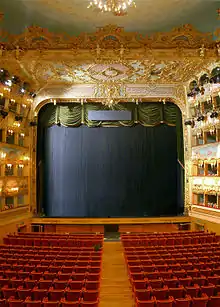Portal:Opera
The Opera Portal
Opera is an art form in which singers and musicians perform a dramatic work (called an opera) which combines a text (called a libretto) and a musical score. Opera is part of the Western classical music tradition. Opera incorporates many of the elements of spoken theatre, such as acting, scenery and costumes and sometimes includes dance. The performance is typically given in an opera house, accompanied by an orchestra or smaller musical ensemble.
Opera started in Italy at the end of the 16th century (with Jacopo Peri's lost Dafne, produced in Florence around 1597), and was championed by Claudio Monteverdi with works such as L'Orfeo. It soon spread through the rest of Europe: Schütz in Germany, Lully in France, and Purcell in England all helped to establish their national traditions in the 17th century. However, in the 18th century, Italian opera continued to dominate most of Europe, except France, attracting foreign composers such as Handel. Opera seria was the most prestigious form of Italian opera, until Gluck reacted against its artificiality with his "reform" operas in the 1760s. Today the most renowned figure of late 18th century opera is Mozart, who began with opera seria but is most famous for his Italian comic operas, especially The Marriage of Figaro, Don Giovanni, and Così fan tutte, as well as The Magic Flute, a landmark in the German tradition.
The first third of the 19th century saw the highpoint of the bel canto style, with Rossini, Donizetti and Bellini all creating works that are still performed today. It also saw the advent of Grand Opera typified by the works of Meyerbeer. The mid to late 19th century is considered by some a golden age of opera, led by Wagner in Germany and Verdi in Italy. This 'golden age' developed through the verismo era in Italy and contemporary French opera through to Puccini and Strauss in the early 20th century. During the 19th century, parallel operatic traditions emerged in Central and Eastern Europe, particularly in Russia and Bohemia. The 20th century saw many experiments with modern styles, such as atonality and serialism (Schoenberg and Berg), Neo-Classicism (Stravinsky), and Minimalism (Philip Glass and John Adams). With the rise of recording technology, singers such as Enrico Caruso became known to audiences beyond the circle of opera fans. Operas were also performed on (and written for) radio and television.
| More about Opera... |
Selected article

Featured picture
In this month

- 15 October 1932 – San Francisco Opera inaugurated the new War Memorial Opera House with a performance of Tosca. Claudia Muzio (pictured) sang the title role.
- 18 October 1810 – The celebrated Italian tenor Mario (Cavalier Giovanni Matteo de Candia, Marquis of Candia) was born in Cagliari.
- 19 October 1701 – La púrpura de la rosa, the first known opera to be composed and performed in the Americas, premiered at the Viceroy's Palace in Lima, Peru.
- 20 October 1973 – The Sydney Opera House was formally opened by Queen Elizabeth II.
- 22 October 1987 – John Adams' opera Nixon in China had its world premiere at the Houston Grand Opera in a production by Peter Sellars with choreography by Mark Morris.
- 24 October 1948 – Franz Lehár, the composer of The Merry Widow, died in Bad Ischl, Austria.
- 27 October 1922 – Rita Fornia, the soprano who created the role of the Abbess in Puccini's Suor Angelica, died in Paris at the age of 44.
- 29 October 1787 – Mozart's opera Don Giovanni had its world premiere at the Estates Theatre in Prague, with Luigi Bassi in the title role.
Selected biography
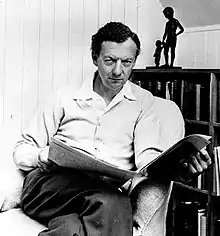
Selected quote
Selected audio
1912 recording by Enrico Caruso and Geraldine Farrar of a scene from act 2 of Jules Massenet's Manon (1884).
Did you know?
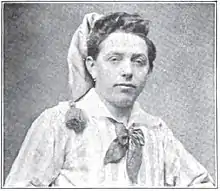
- ...that Bernardo De Pace {pictured), an Italian immigrant, started his own opera company and eventually performed at the Metropolitan Opera in New York?
- ...that Otar Taktakishvili's opera Mindia was based on Vazha-Pshavela's epic poem The Snake-eater and premiered in 1961, the centenary of the poet's birth?"
- ....that in Telemaco, one of Alessandro Scarlatti's last operas, Minerva enters in a chariot which holds a string orchestra with trumpets?
Related portals
WikiProjects
- Parent projects
WikiProject Arts • WikiProject Music • WikiProject Theatre

- Main project
WikiProject Opera
- Descendant projects
WikiProject Richard Wagner • WikiProject Gilbert and Sullivan
- Similar projects
WikiProject Classical music • WikiProject Composers
What are WikiProjects?
Main topics
Opera history: Origins of opera • Italian opera • Opera in German • French opera • Opera in English • Polish opera • Russian opera • Hungarian opera • Armenian opera • Opera in Latin America
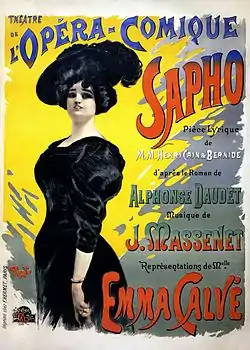
Opera genres: Azione teatrale · Ballad opera · Comédie en vaudevilles · Comédie mêlée d'ariettes · Dramma giocoso · Dramma per musica · Farsa · Festa teatrale · Género chico · Grand Opera · Music Drama · Opéra-ballet · Opera buffa · Opéra bouffe · Opéra bouffon · Opéra comique · Opéra féerie · Opera semiseria · Opera seria · Operetta · Pastorale héroïque · Romantische Oper · Savoy opera · Semi-opera · Singspiel · Spieloper · Tragédie en musique · Verismo · Zarzuela · Zeitoper
Opera terms: Aria · Aria di sorbetto · Arioso · Bel canto · Breeches role · Burletta · Cabaletta · Cadenza · Cantabile · Castrato · Cavatina · Chest voice · Claque · Coloratura · Comprimario · Convenienze · Coup de glotte · Da capo aria · Diva · Entr'acte · Fach · Falsetto · Fioritura · Gesamtkunstwerk · Head voice · Intermezzo · Kammersänger · Leitmotif · Legato · Libretto · Literaturoper · Mad scene · Maestro · Melodrama · Melodramma · Monodrama · Messa di voce · Opera house · Passaggio · Portamento · Prima donna · Prompter · Recitative · Regietheater · Répétiteur · Sitzprobe · Spinto · Sprechgesang · Squillo · Stagione · Surtitles · Tessitura · Timbre · Vibrato
Opera voices: Baritenor · Baritone · Bass · Bass-baritone · Coloratura soprano · Contralto · Countertenor · Dramatic soprano · Haute-contre · Lyric soprano · Mezzo-soprano · Soprano · Soubrette · Spinto soprano · Tenor · Tenore contraltino · Tenore di grazia
Opera lists: Opera topics • List of operas by composer • Important operas • Major opera composers • Opera librettists • Opera houses • Opera companies • Opera festivals • Opera directors • Operetta composers • Orphean operas • Zarzuela composers • Opera genres • Operas set in the Crusades • The Record of Singing • Bayreuth canon
Featured content

| This is a list of recognized content, updated weekly by JL-Bot (talk · contribs) (typically on Saturdays). There is no need to edit the list yourself. If an article is missing from the list, make sure it is tagged (e.g. {{WikiProject Opera}}) or categorized correctly and wait for the next update. See WP:RECOG for configuration options. |
Featured articles
 Agrippina (opera)
Agrippina (opera) L'Ange de Nisida
L'Ange de Nisida L'Arianna
L'Arianna The Bartered Bride
The Bartered Bride Georges Bizet
Georges Bizet Benjamin Britten
Benjamin Britten Alan Bush
Alan Bush Carmen
Carmen English National Opera
English National Opera Falstaff (opera)
Falstaff (opera) Kathleen Ferrier
Kathleen Ferrier Gianni Schicchi
Gianni Schicchi Handel's lost Hamburg operas
Handel's lost Hamburg operas His Majesty's Theatre, London
His Majesty's Theatre, London L'incoronazione di Poppea
L'incoronazione di Poppea Lost operas by Claudio Monteverdi
Lost operas by Claudio Monteverdi Jules Massenet
Jules Massenet Felix Mendelssohn
Felix Mendelssohn André Messager
André Messager Claudio Monteverdi
Claudio Monteverdi Carl Nielsen
Carl Nielsen Nixon in China
Nixon in China Noye's Fludde
Noye's Fludde L'Orfeo
L'Orfeo Orpheus in the Underworld
Orpheus in the Underworld Les pêcheurs de perles
Les pêcheurs de perles Maurice Ravel
Maurice Ravel Rhinemaidens
Rhinemaidens Nikolai Rimsky-Korsakov
Nikolai Rimsky-Korsakov Rinaldo (opera)
Rinaldo (opera) Il ritorno d'Ulisse in patria
Il ritorno d'Ulisse in patria Gioachino Rossini
Gioachino Rossini The Royal Opera
The Royal Opera Bedřich Smetana
Bedřich Smetana Charles Villiers Stanford
Charles Villiers Stanford Pyotr Ilyich Tchaikovsky
Pyotr Ilyich Tchaikovsky Michael Tippett
Michael Tippett Tosca
Tosca Richard Wagner
Richard Wagner
Featured lists
Good articles
 Marian Anderson
Marian Anderson W. H. Auden
W. H. Auden Helena Braun
Helena Braun Ferruccio Busoni
Ferruccio Busoni The Castafiore Emerald
The Castafiore Emerald Soňa Červená
Soňa Červená Patrice Chéreau
Patrice Chéreau Erik Chisholm
Erik Chisholm Graham Clark (tenor)
Graham Clark (tenor) Doctor Ox's Experiment (opera)
Doctor Ox's Experiment (opera) John Thomas Douglass
John Thomas Douglass Ernest II, Duke of Saxe-Coburg and Gotha
Ernest II, Duke of Saxe-Coburg and Gotha The Fairy-Queen
The Fairy-Queen Fatinitza
Fatinitza Fire Shut Up in My Bones
Fire Shut Up in My Bones Éva Gauthier
Éva Gauthier Johanna Geisler
Johanna Geisler Grant Park Music Festival
Grant Park Music Festival Edita Gruberová
Edita Gruberová Robert Hale (bass-baritone)
Robert Hale (bass-baritone) Julius Harrison
Julius Harrison Leoš Janáček
Leoš Janáček Enriqueta Legorreta
Enriqueta Legorreta Berit Lindholm
Berit Lindholm The Maiden in the Tower
The Maiden in the Tower Giacomo Meyerbeer
Giacomo Meyerbeer Beatriz Michelena
Beatriz Michelena Nabucco
Nabucco Jessye Norman
Jessye Norman Jacques Offenbach
Jacques Offenbach Opera in Ukraine
Opera in Ukraine Orfeo ed Euridice
Orfeo ed Euridice Antonio Paoli
Antonio Paoli Parsifal
Parsifal Sergei Prokofiev
Sergei Prokofiev Maria Radner
Maria Radner Robert le diable
Robert le diable Gabriele Schnaut
Gabriele Schnaut Franz Schubert
Franz Schubert Johann Strauss II
Johann Strauss II Twice Through the Heart
Twice Through the Heart Va tacito e nascosto
Va tacito e nascosto Giuseppe Verdi
Giuseppe Verdi Claude Vivier
Claude Vivier Wales Millennium Centre
Wales Millennium Centre Welsh National Opera
Welsh National Opera Portia White
Portia White Steuart Wilson
Steuart Wilson Rachel Yakar
Rachel Yakar
Featured pictures
 1899 poster of Mme. M. Sissieretta Jones
1899 poster of Mme. M. Sissieretta Jones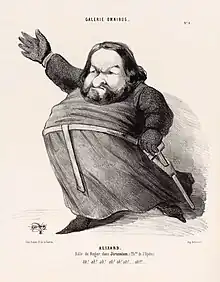 Adolphe-Joseph-Louis Alizard from Le Charivari
Adolphe-Joseph-Louis Alizard from Le Charivari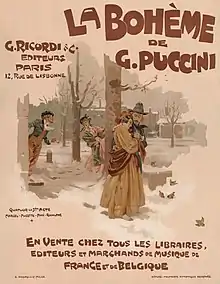 Advertisement for the music score of La Bohème, 1895
Advertisement for the music score of La Bohème, 1895 Aida poster colors fixed
Aida poster colors fixed_-_Archivio_Storico_Ricordi_ICON000086_-_Restoration.jpg.webp) Al quartiere latino, bozzetto di Adolf Hohenstein per La Bohème (1896) - Archivio Storico Ricordi ICON000086 - Restoration
Al quartiere latino, bozzetto di Adolf Hohenstein per La Bohème (1896) - Archivio Storico Ricordi ICON000086 - Restoration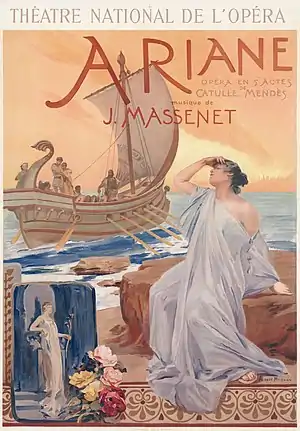 Albert Pierre-René Maignan - Jules Massenet - Ariane
Albert Pierre-René Maignan - Jules Massenet - Ariane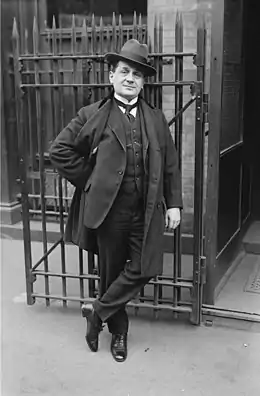 Albert Reiss LOC ggbain-25651
Albert Reiss LOC ggbain-25651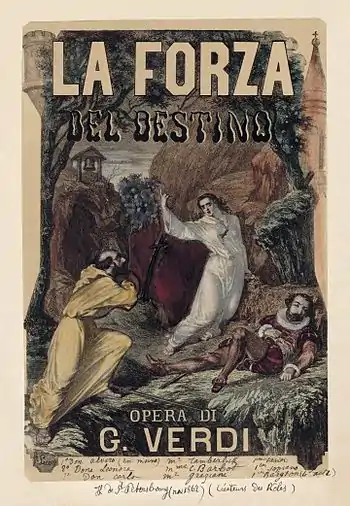 Alexandre Charles Lecocq - Giuseppe Verdi - La forza del destino
Alexandre Charles Lecocq - Giuseppe Verdi - La forza del destino.jpg.webp) Alexandre Fragonard - Scène de L'orage (Barbier de Séville)
Alexandre Fragonard - Scène de L'orage (Barbier de Séville) Alexandre Lacauchie - Gilbert Duprez as Gaston in Verdi's Jérusalem
Alexandre Lacauchie - Gilbert Duprez as Gaston in Verdi's Jérusalem Alfredo Edel - Jules Massenet - Le mage
Alfredo Edel - Jules Massenet - Le mage Alice Neilsen's production of Victor Herbert's The Fortune Teller
Alice Neilsen's production of Victor Herbert's The Fortune Teller_-_Archivio_Storico_Ricordi_FOTO000794_-_Restoration.jpg.webp) Amilcare Ponchielli (before 1886) - Archivio Storico Ricordi FOTO000794 - Restoration
Amilcare Ponchielli (before 1886) - Archivio Storico Ricordi FOTO000794 - Restoration.jpg.webp) Amédée Forestier - Illustrated London News - Gilbert and Sullivan - Ruddygore (Ruddigore)
Amédée Forestier - Illustrated London News - Gilbert and Sullivan - Ruddygore (Ruddigore)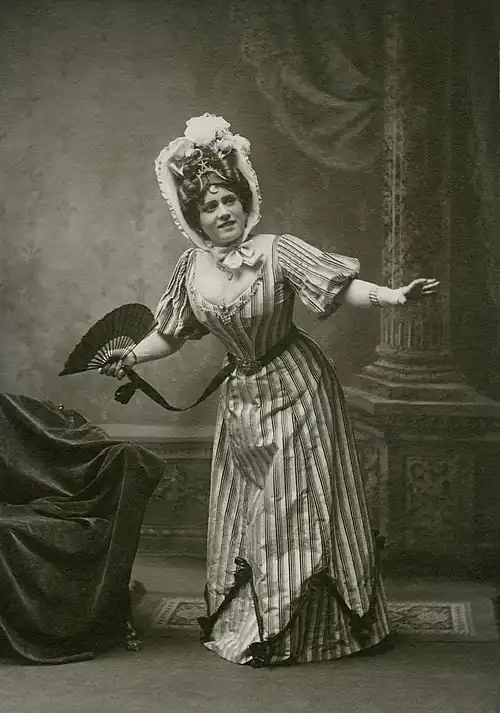 Anna Fernqvist, rollporträtt - SMV - H1 122 - Restoration
Anna Fernqvist, rollporträtt - SMV - H1 122 - Restoration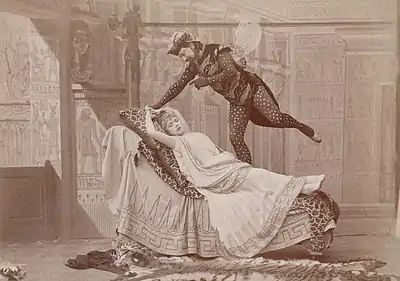 Atelier Nadar - Fly scene from Offenbach's Orphée aux enfers with Jeanne Granier as Eurydice and Eugène Vauthier as Jupiter, 1887 revival, wide-angle shot
Atelier Nadar - Fly scene from Offenbach's Orphée aux enfers with Jeanne Granier as Eurydice and Eugène Vauthier as Jupiter, 1887 revival, wide-angle shot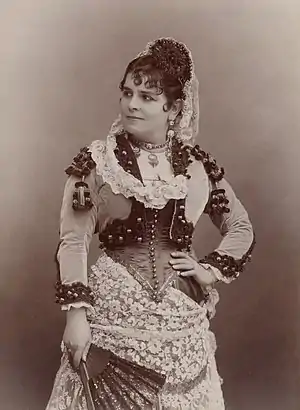 Atelier Nadar - Galli-Marié in Bizet's Carmen
Atelier Nadar - Galli-Marié in Bizet's Carmen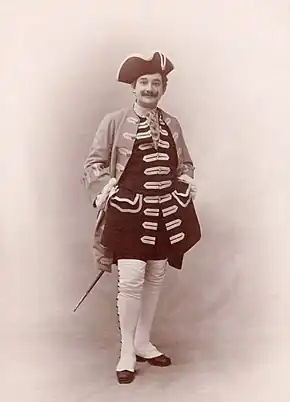 Atelier Nadar - Jacques Isnardon, Vaudeville
Atelier Nadar - Jacques Isnardon, Vaudeville.jpg.webp) Auguste François-Marie Gorguet - poster for the première performance of Édouard Lalo's Le roi d'Ys (1888)
Auguste François-Marie Gorguet - poster for the première performance of Édouard Lalo's Le roi d'Ys (1888) Barbier, Jules, Nadar, Gallica
Barbier, Jules, Nadar, Gallica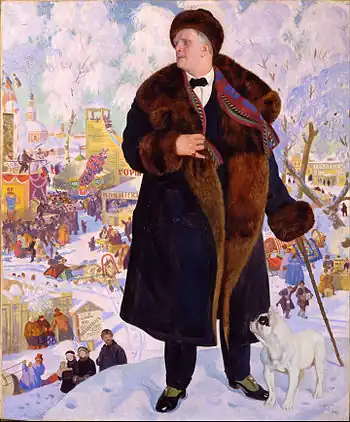 Boris Kustodiev - Portrait of Fyodor Chaliapin - Google Art Project
Boris Kustodiev - Portrait of Fyodor Chaliapin - Google Art Project Carl Nielsen c. 1908 - Restoration
Carl Nielsen c. 1908 - Restoration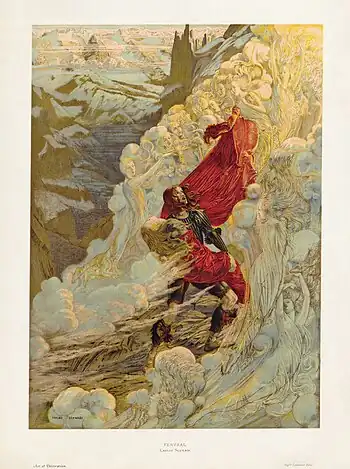 Carloz Schwabe - Vincent d'Indy's Fervaal
Carloz Schwabe - Vincent d'Indy's Fervaal Cavalleria Rusticana - Alfio and Turiddu embrace
Cavalleria Rusticana - Alfio and Turiddu embrace Cavalleria Rusticana - Santuzza and Turiddu outside the church
Cavalleria Rusticana - Santuzza and Turiddu outside the church_by_Nadar.jpg.webp) Charles Gounod (1890) by Nadar
Charles Gounod (1890) by Nadar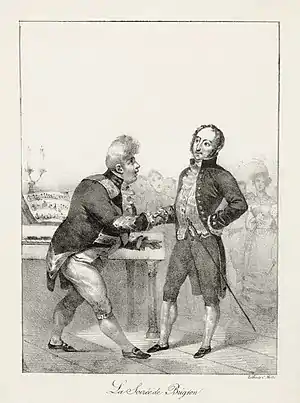 Charles Motte - Rossini et Georges IV - la soirée de Brighton
Charles Motte - Rossini et Georges IV - la soirée de Brighton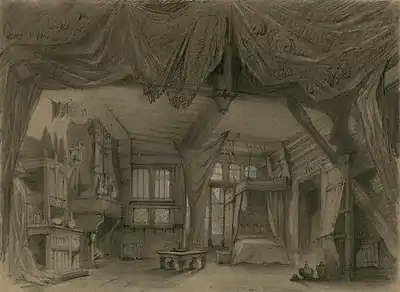 Charles-Antoine Cambon - La Esmeralda, Act 3, Scene 2 set
Charles-Antoine Cambon - La Esmeralda, Act 3, Scene 2 set.jpg.webp) Charles-Antoine Cambon - La Esmeralda, Act III, Scene 1 set design (Version 2)
Charles-Antoine Cambon - La Esmeralda, Act III, Scene 1 set design (Version 2) Charles-Antoine Cambon - Set design for Act V, Scene 2 of Fromental Halévy's La reine de Chypre
Charles-Antoine Cambon - Set design for Act V, Scene 2 of Fromental Halévy's La reine de Chypre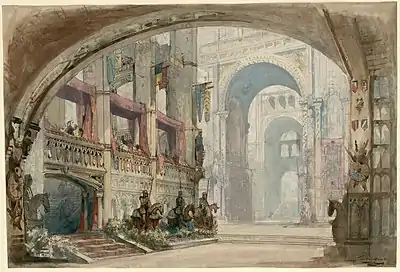 Charles-Antoine Cambon - Set design for the première of Rossini's Robert Bruce, Act III, Scene 3
Charles-Antoine Cambon - Set design for the première of Rossini's Robert Bruce, Act III, Scene 3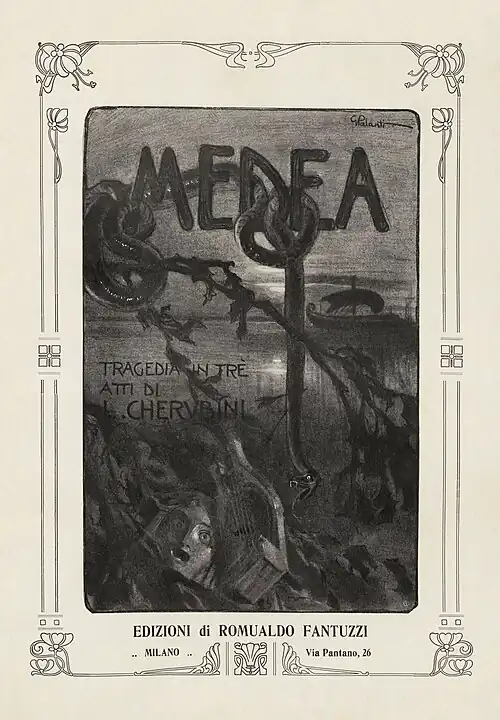 Cherubini, Luigi - Medea - Restoration
Cherubini, Luigi - Medea - Restoration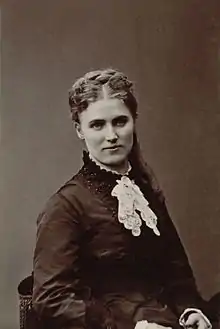 Christine Nilsson Nadar
Christine Nilsson Nadar Colette and Maurice Ravel's L'enfant et les sortilèges, 1st scene
Colette and Maurice Ravel's L'enfant et les sortilèges, 1st scene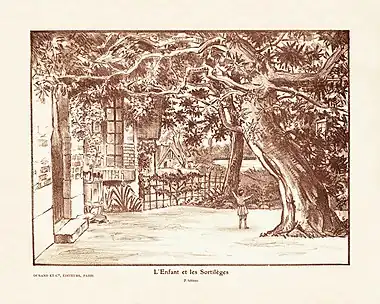 Colette and Maurice Ravel's L'enfant et les sortilèges, 2nd scene
Colette and Maurice Ravel's L'enfant et les sortilèges, 2nd scene_-_Archivio_Storico_Ricordi_ICON000079_-_Restoration.jpg.webp) Collina presso Nagasaki, bozzetto di Alexandre Bailly, Marcel Jambon per Madama Butterfly (1906) - Archivio Storico Ricordi ICON000079 - Restoration
Collina presso Nagasaki, bozzetto di Alexandre Bailly, Marcel Jambon per Madama Butterfly (1906) - Archivio Storico Ricordi ICON000079 - Restoration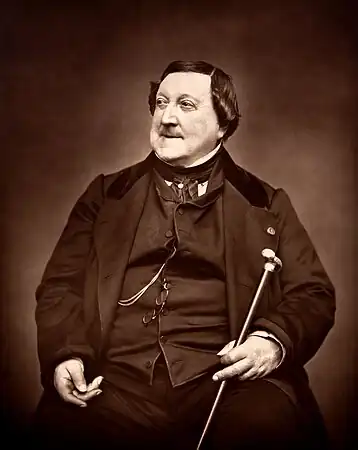 Composer Rossini G 1865 by Carjat - Restoration
Composer Rossini G 1865 by Carjat - Restoration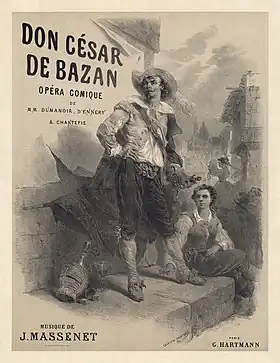 Célestin Nanteuil - Jules Massenet - Don César de Bazan
Célestin Nanteuil - Jules Massenet - Don César de Bazan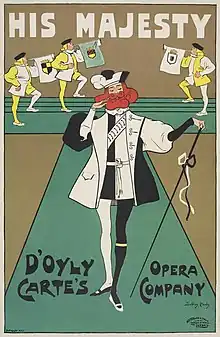 Dudley Hardy - Poster for His Majesty
Dudley Hardy - Poster for His Majesty Edmond Cavé 1844 Ingres - NY Met Museum of Art
Edmond Cavé 1844 Ingres - NY Met Museum of Art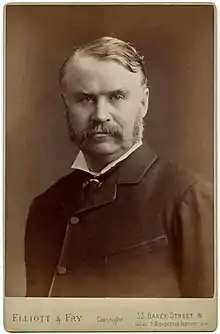 Elliott & Fry - photograph W. S. Gilbert
Elliott & Fry - photograph W. S. Gilbert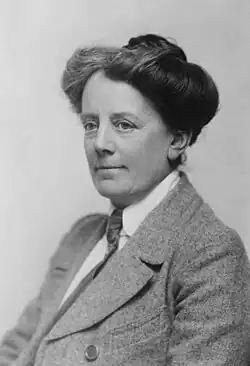 Ethel Smyth
Ethel Smyth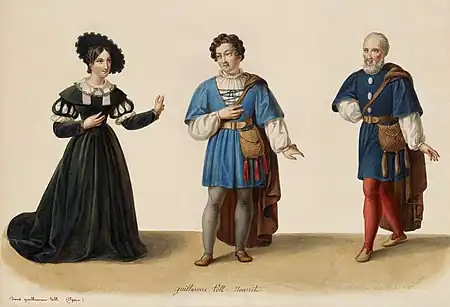 Eugène Du Faget - Costume designs for Guillaume Tell - 1-3. Laure Cinti-Damoreau as Mathilde, Adolphe Nourrit as Arnold Melchtal, and Nicolas Levasseur as Walter Furst
Eugène Du Faget - Costume designs for Guillaume Tell - 1-3. Laure Cinti-Damoreau as Mathilde, Adolphe Nourrit as Arnold Melchtal, and Nicolas Levasseur as Walter Furst Eugène Du Faget - Costume designs for Les Huguenots - 2. Julie Dorus-Gras as Marguerite, Adolphe Nourrit as Raoul, and Cornélie Falcon as Valentine
Eugène Du Faget - Costume designs for Les Huguenots - 2. Julie Dorus-Gras as Marguerite, Adolphe Nourrit as Raoul, and Cornélie Falcon as Valentine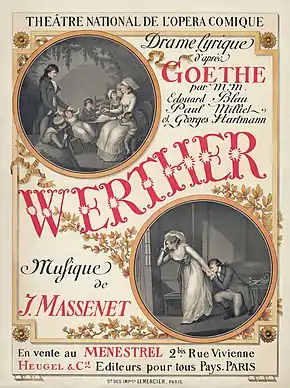 Eugène Grasset - Jules Massenet - Werther
Eugène Grasset - Jules Massenet - Werther Falstaff 3
Falstaff 3 Fausta Labia, porträtt - SMV - H5 028 - Restoration
Fausta Labia, porträtt - SMV - H5 028 - Restoration François-Joseph Bélanger - Set design for Gluck's Alceste
François-Joseph Bélanger - Set design for Gluck's Alceste Fromental Halévy, L'Éclair score cover - Restoration
Fromental Halévy, L'Éclair score cover - Restoration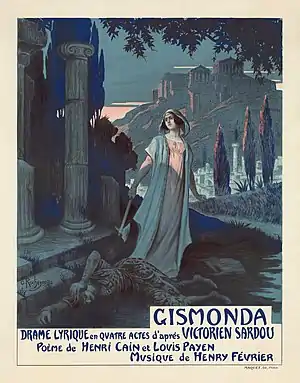 Georges Rochegrosse - Henry Février - Henri Cain and Louis Payen after Victorien Sardou - Gismonda
Georges Rochegrosse - Henry Février - Henri Cain and Louis Payen after Victorien Sardou - Gismonda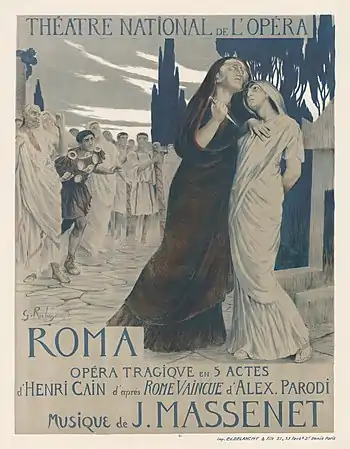 Georges Rochegrosse - Jules Massenet - Roma
Georges Rochegrosse - Jules Massenet - Roma.jpg.webp) Georges Rochegrosse - Poster for Gabriel Fauré's Pénélope (1913)
Georges Rochegrosse - Poster for Gabriel Fauré's Pénélope (1913)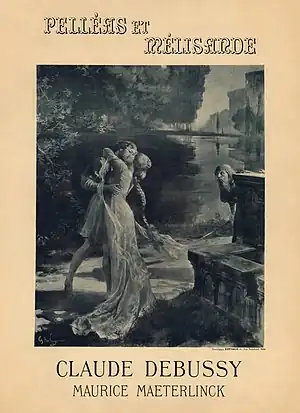 Georges Rochegrosse - Poster for the prèmiere of Claude Debussy and Maurice Maeterlinck's Pelléas et Mélisande
Georges Rochegrosse - Poster for the prèmiere of Claude Debussy and Maurice Maeterlinck's Pelléas et Mélisande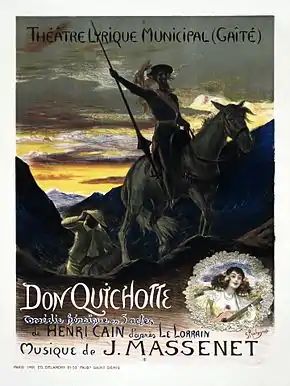 Georges Rochegrosse's poster for Jules Massenet's Don Quichotte
Georges Rochegrosse's poster for Jules Massenet's Don Quichotte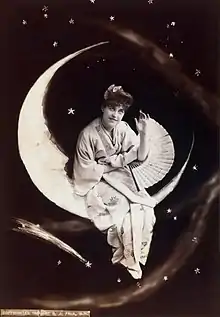 Geraldine Ulmar in Gilbert and Sullivan's The Mikado - photograph only
Geraldine Ulmar in Gilbert and Sullivan's The Mikado - photograph only_-_Archivio_Storico_Ricordi_FOTO003293_-_Restoration.jpg.webp) Giacomo Puccini (1924) - Archivio Storico Ricordi FOTO003293 - Restoration
Giacomo Puccini (1924) - Archivio Storico Ricordi FOTO003293 - Restoration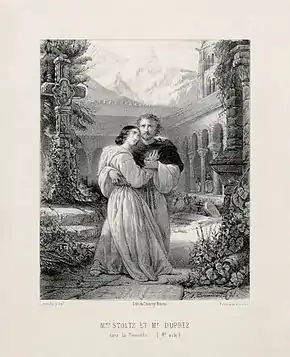 Gilbert Duprez & Rosine Stoltz in Donizetti's La Favorite
Gilbert Duprez & Rosine Stoltz in Donizetti's La Favorite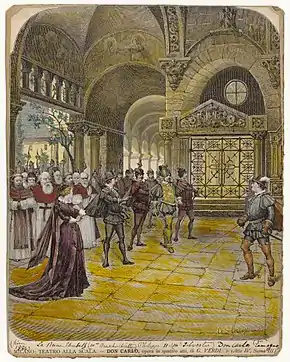 Giuseppe Barberis - Carlo Cornaglia - Giuseppe Verdi's Don Carlo at La Scala
Giuseppe Barberis - Carlo Cornaglia - Giuseppe Verdi's Don Carlo at La Scala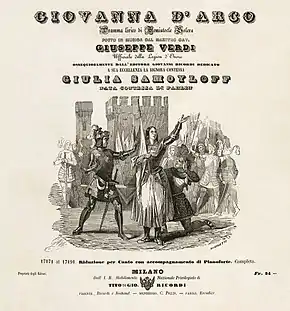 Giuseppe Verdi, Giovanna d'Arco, Vocal Score - Restoration
Giuseppe Verdi, Giovanna d'Arco, Vocal Score - Restoration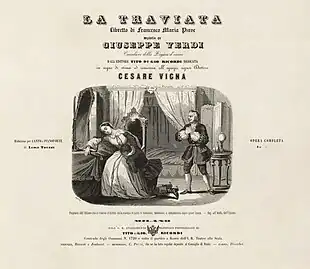 Giuseppe Verdi, La traviata title page - Restoration
Giuseppe Verdi, La traviata title page - Restoration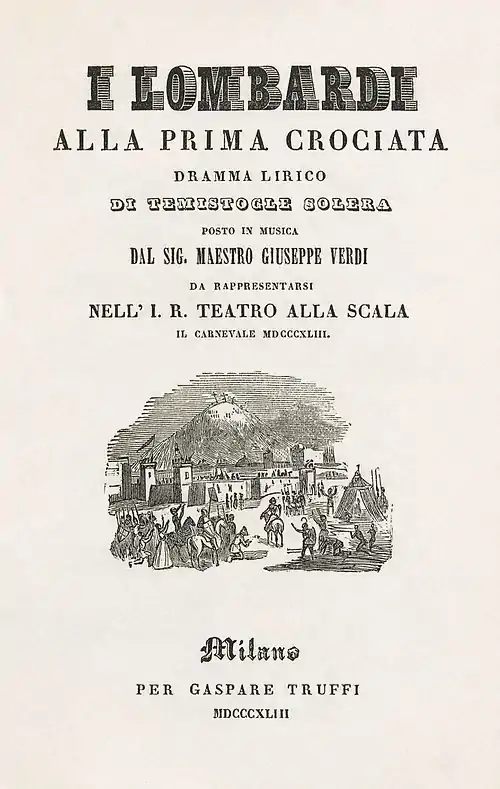 Giuseppe Verdi, Lombardi alla prima crociata. Libretto, 1843 - Restoration
Giuseppe Verdi, Lombardi alla prima crociata. Libretto, 1843 - Restoration Giuseppe Verdi, Rigoletto, Vocal score illustration by Roberto Focosi - Restoration
Giuseppe Verdi, Rigoletto, Vocal score illustration by Roberto Focosi - Restoration Giuseppe Verdi, Simon Boccanegra first edition libretto for the 1881 revision of the opera - Restoration
Giuseppe Verdi, Simon Boccanegra first edition libretto for the 1881 revision of the opera - Restoration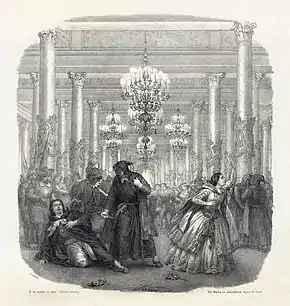 Giuseppe Verdi, Un Ballo in maschera, Vocal score frontispiece - restoration
Giuseppe Verdi, Un Ballo in maschera, Vocal score frontispiece - restoration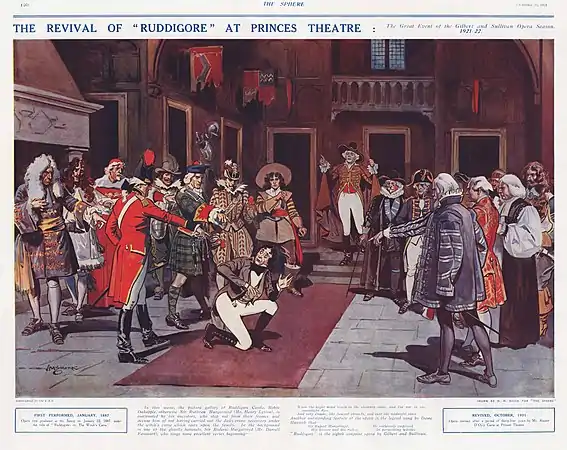 H. M. Brock - Gilbert and Sullivan - D'Oyly Carte Opera Company Ruddigore revival 1921
H. M. Brock - Gilbert and Sullivan - D'Oyly Carte Opera Company Ruddigore revival 1921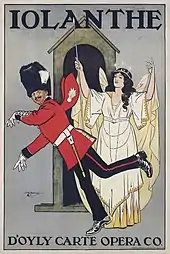 H. M. Brock - Poster for Iolanthe
H. M. Brock - Poster for Iolanthe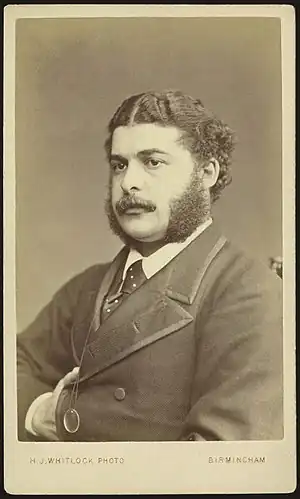 H.J. Whitlock - Photograph of Arthur Sullivan
H.J. Whitlock - Photograph of Arthur Sullivan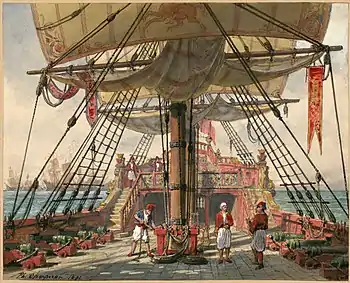 Haydée, ou Le secret Act II - Philippe Chaperon
Haydée, ou Le secret Act II - Philippe Chaperon Hector Berlioz, Béatrice et Bénédict score title page - Restoration
Hector Berlioz, Béatrice et Bénédict score title page - Restoration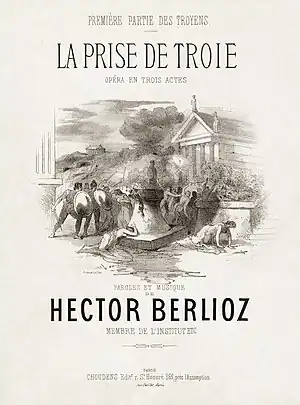 Hector Berlioz, La Prise de Troie score cover - Restoration
Hector Berlioz, La Prise de Troie score cover - Restoration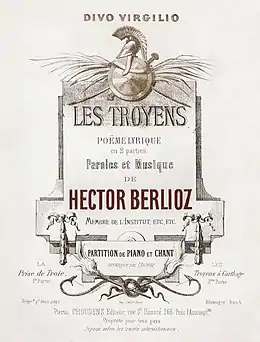 Hector Berlioz, Les Troyens vocal score cover - Restoration
Hector Berlioz, Les Troyens vocal score cover - Restoration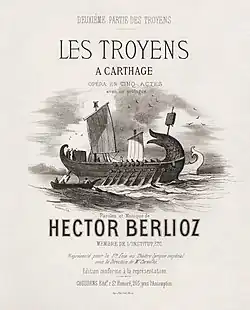 Hector Berlioz, Les Troyens à Carthage vocal score cover - Restoration
Hector Berlioz, Les Troyens à Carthage vocal score cover - Restoration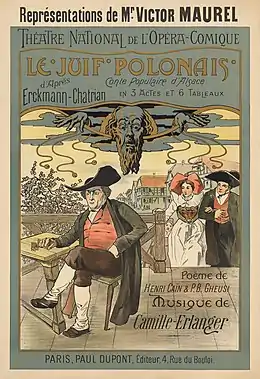 Henri C. R. Presseq - Camille Erlanger - Le juif polonais
Henri C. R. Presseq - Camille Erlanger - Le juif polonais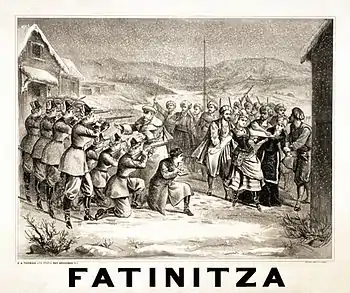 Henry Atwell Thomas - Franz von Suppé - Fatinitza
Henry Atwell Thomas - Franz von Suppé - Fatinitza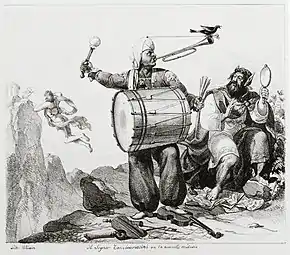 Il signor Tambourossini - Delaroche
Il signor Tambourossini - Delaroche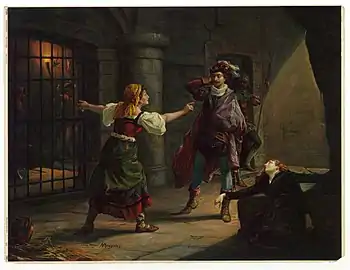 Il trovatore by Luigi Morgari
Il trovatore by Luigi Morgari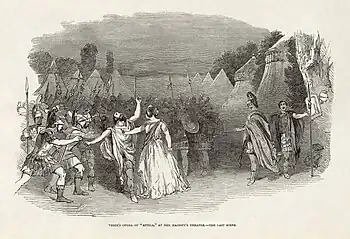 Illustrated London News - Giuseppe Verdi's Attila at Her Majesty's Theatre, London
Illustrated London News - Giuseppe Verdi's Attila at Her Majesty's Theatre, London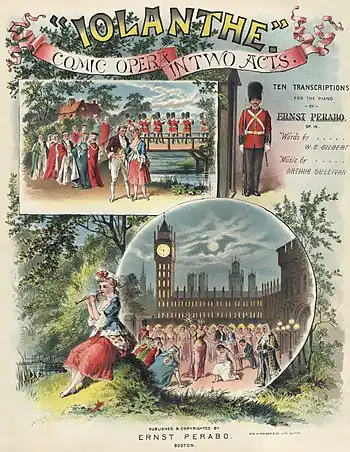 Iolanthe piano transcriptions by Ernst Perabo
Iolanthe piano transcriptions by Ernst Perabo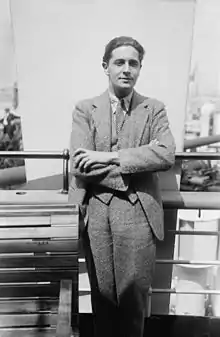 Ivor Novello
Ivor Novello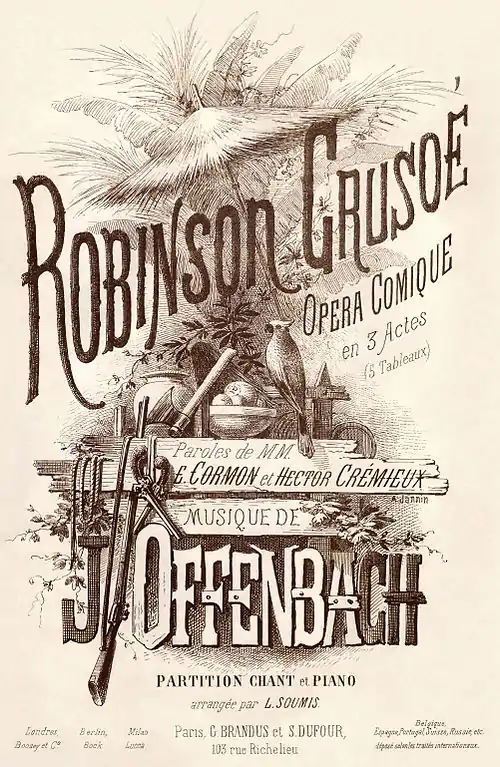 Jacques Offenbach - A. Jannin - Robinson Crusoé
Jacques Offenbach - A. Jannin - Robinson Crusoé Jacques Offenbach by Nadar
Jacques Offenbach by Nadar Jean de Paleologu - Jules Massenet - Sapho
Jean de Paleologu - Jules Massenet - Sapho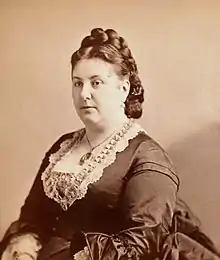 Jeremiah Gurney - Photograph of Euphrosyne Parepa-Rosa
Jeremiah Gurney - Photograph of Euphrosyne Parepa-Rosa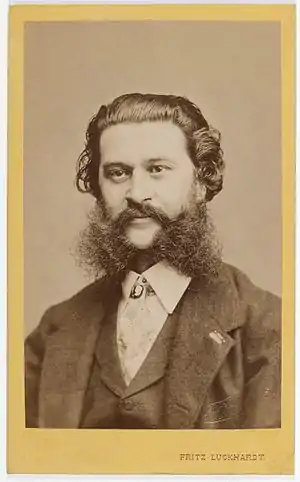 Johann Strauss II by Fritz Luckhardt
Johann Strauss II by Fritz Luckhardt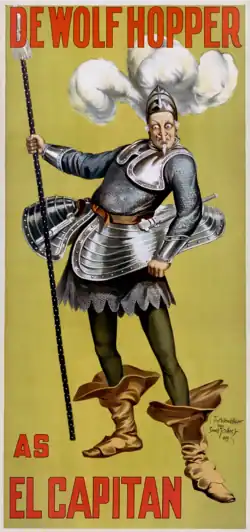 John Phillip Sousa - De Wolf Hopper - El Capitan1
John Phillip Sousa - De Wolf Hopper - El Capitan1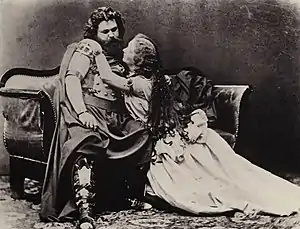 Joseph Albert - Ludwig und Malwine Schnorr von Carolsfeld - Tristan und Isolde, 1865f
Joseph Albert - Ludwig und Malwine Schnorr von Carolsfeld - Tristan und Isolde, 1865f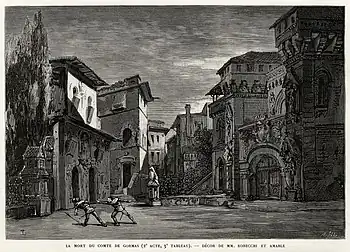 Jules Massenet - Le Cid 2e Acte, 3e Tableau - L'Illustration
Jules Massenet - Le Cid 2e Acte, 3e Tableau - L'Illustration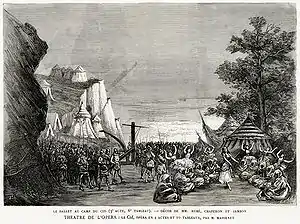 Jules Massenet - Le Cid 3e Acte, 6e Tableau - L'Illustration
Jules Massenet - Le Cid 3e Acte, 6e Tableau - L'Illustration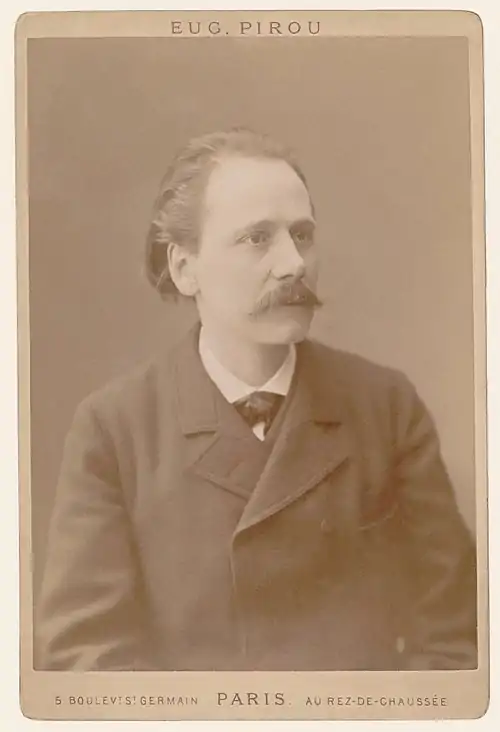 Jules Massenet by Eugène Pirou
Jules Massenet by Eugène Pirou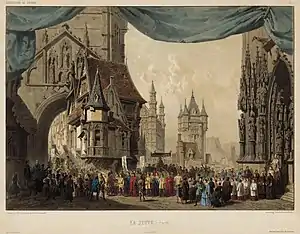 La Juive Act 1 set 1835 - Restoration
La Juive Act 1 set 1835 - Restoration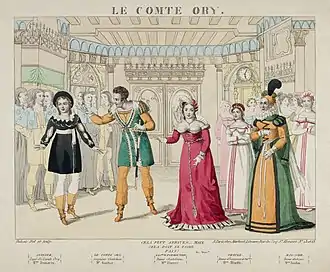 Le comte Ory - Dubois & chez Martinet - Final scene
Le comte Ory - Dubois & chez Martinet - Final scene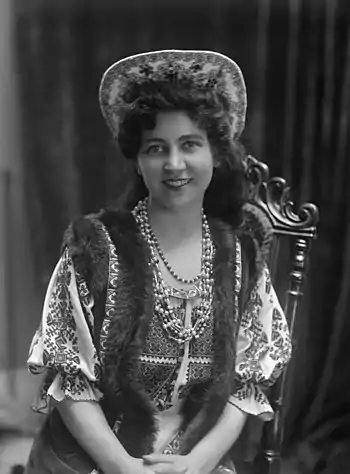 Lilly Walleni in Daria at Kungliga Operan 1907 - SMV - NV059
Lilly Walleni in Daria at Kungliga Operan 1907 - SMV - NV059.jpg.webp) Louis Guéymard as Robert le Diable by Gustave Courbet - The Metropolitan Museum of Art 436015 (cropped)
Louis Guéymard as Robert le Diable by Gustave Courbet - The Metropolitan Museum of Art 436015 (cropped) Lucy Arbell as Queen Amahelli in Massenet's Bacchus, wide view
Lucy Arbell as Queen Amahelli in Massenet's Bacchus, wide view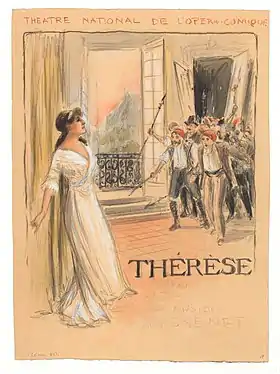 Lucy Arbell in Massenet's Thérèse
Lucy Arbell in Massenet's Thérèse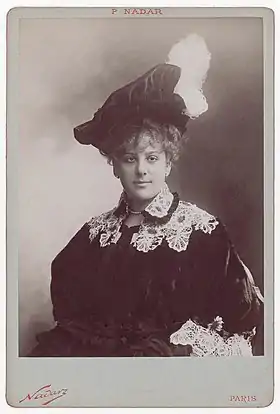 Lucy Arbell photographed by Paul Nadar
Lucy Arbell photographed by Paul Nadar Luigi Verardi after Dominico Ferri - Gaetano Donizetti - Carrefour de St Jean et Paul. Dans l'Opéra Marino Faliero
Luigi Verardi after Dominico Ferri - Gaetano Donizetti - Carrefour de St Jean et Paul. Dans l'Opéra Marino Faliero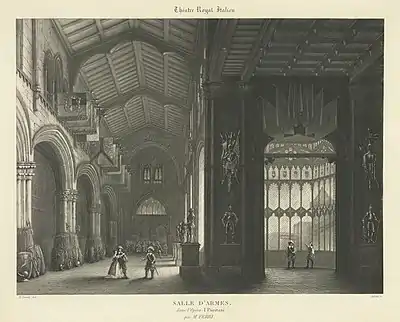 Luigi Verardi after Dominico Ferri - Vincenzo Bellini - Théatre Royal Italien. Salle d'armes dans l'Opéra I Puritani
Luigi Verardi after Dominico Ferri - Vincenzo Bellini - Théatre Royal Italien. Salle d'armes dans l'Opéra I Puritani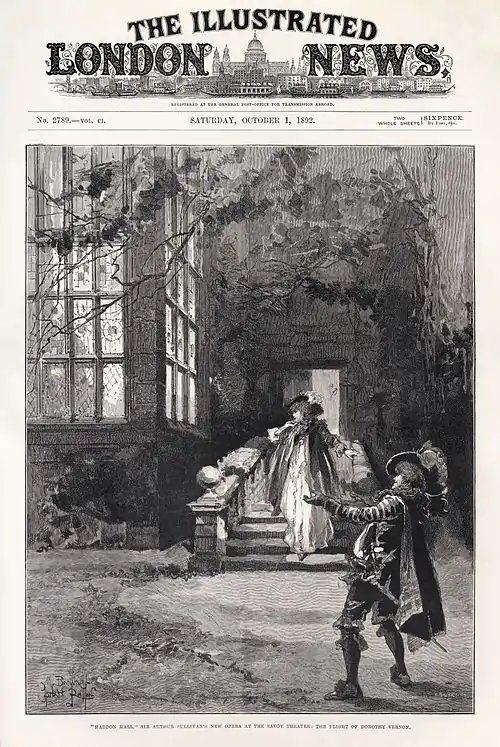 M. Browne - Herbert Railton - Sydney Grundy - Arthur Sullivan - Haddon Hall
M. Browne - Herbert Railton - Sydney Grundy - Arthur Sullivan - Haddon Hall.jpg.webp) Mademoiselle Maupin de l'Opéra (Julie d'Aubigny)
Mademoiselle Maupin de l'Opéra (Julie d'Aubigny)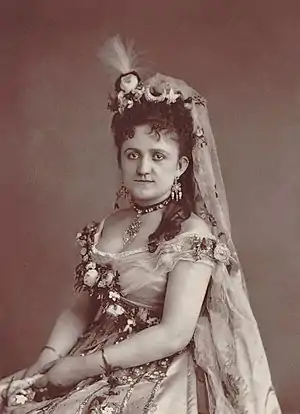 Mademoiselle Priola de l'Opéra Comique, rôle de Javotte dans "Le Roi l'a dit" de Delibes
Mademoiselle Priola de l'Opéra Comique, rôle de Javotte dans "Le Roi l'a dit" de Delibes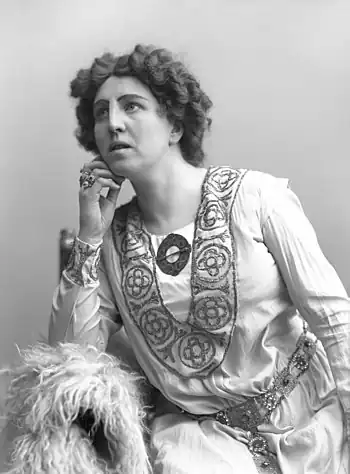 Magna Lykseth in Tristan och Isolde at Kungliga Operan 1909 - SMV - GL164
Magna Lykseth in Tristan och Isolde at Kungliga Operan 1909 - SMV - GL164 Marcel Jambon - Giuseppe Verdi - Otello Act I set design model
Marcel Jambon - Giuseppe Verdi - Otello Act I set design model_-_Archivio_storico_Ricordi_FOTO003107_-_Restoration.jpg.webp) Maria Carrara Verdi, Barberina Strepponi, Giuseppe Verdi, Giuditta Ricordi, Teresa Stolz, Umberto Campanari, Giulio Ricordi, Leopoldo Metlicovitz (1900) - Archivio storico Ricordi FOTO003107 - Restoration
Maria Carrara Verdi, Barberina Strepponi, Giuseppe Verdi, Giuditta Ricordi, Teresa Stolz, Umberto Campanari, Giulio Ricordi, Leopoldo Metlicovitz (1900) - Archivio storico Ricordi FOTO003107 - Restoration Marian Anderson
Marian Anderson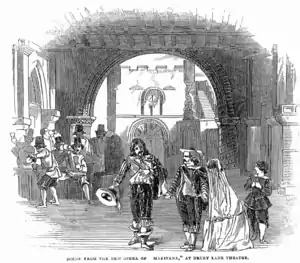 Maritana - Nov 22 1845 Illustrated London News
Maritana - Nov 22 1845 Illustrated London News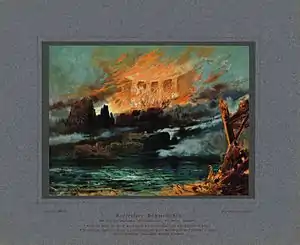 Max Brückner - Otto Henning - Richard Wagner - Final scene of Götterdämmerung
Max Brückner - Otto Henning - Richard Wagner - Final scene of Götterdämmerung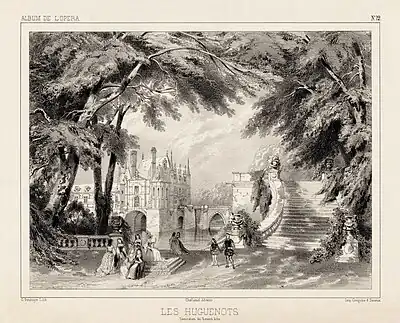 Meyerbeer - Les Huguenots - Décor Acte II
Meyerbeer - Les Huguenots - Décor Acte II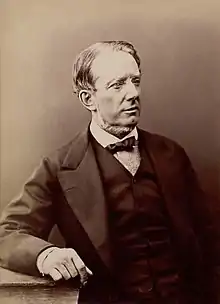 Michael William Balfe - Atelier Nadar
Michael William Balfe - Atelier Nadar_-_Archivio_Storico_Ricordi_ICON002556.jpg.webp) Napoli, strada Acquaquilia, bozzetto di Riccardo Salvadori per A Basso Porto (1894) - Archivio Storico Ricordi ICON002556
Napoli, strada Acquaquilia, bozzetto di Riccardo Salvadori per A Basso Porto (1894) - Archivio Storico Ricordi ICON002556.jpg.webp) Nelly Martyl by Jean Reutlinger (Image 10715)
Nelly Martyl by Jean Reutlinger (Image 10715) Paul Maurou - Poster for Edmond Audran's Gillette de Narbonne
Paul Maurou - Poster for Edmond Audran's Gillette de Narbonne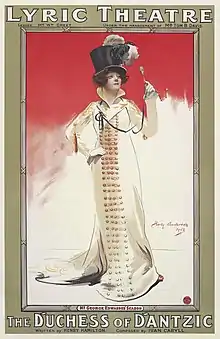 Percy Anderson - Poster for The Duchess of Dantzic
Percy Anderson - Poster for The Duchess of Dantzic.jpg.webp) Philippe Chaperon - Meyerbeer - Les Huguenots Act I (1896)
Philippe Chaperon - Meyerbeer - Les Huguenots Act I (1896)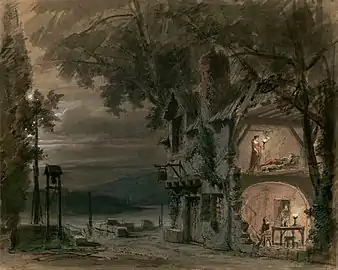 Philippe Chaperon - Rigoletto
Philippe Chaperon - Rigoletto.jpg.webp) Pierre Gaveaux by Edmé Quenedey (1821)
Pierre Gaveaux by Edmé Quenedey (1821)_-_Les_contes_d'Hoffmann_by_Jacques_Offenbach%252C_Giulietta_act.jpg.webp) Pierre-Auguste Lamy (?) - Les contes d'Hoffmann by Jacques Offenbach, Giulietta act
Pierre-Auguste Lamy (?) - Les contes d'Hoffmann by Jacques Offenbach, Giulietta act_-_Les_contes_d'Hoffmann_by_Jacques_Offenbach%252C_Olympia_act.jpg.webp) Pierre-Auguste Lamy (?) - Les contes d'Hoffmann by Jacques Offenbach, Olympia act
Pierre-Auguste Lamy (?) - Les contes d'Hoffmann by Jacques Offenbach, Olympia act_-_Les_contes_d'Hoffmann_by_Jacques_Offenbach%252C_prologue.jpg.webp) Pierre-Auguste Lamy (?) - Les contes d'Hoffmann by Jacques Offenbach, prologue
Pierre-Auguste Lamy (?) - Les contes d'Hoffmann by Jacques Offenbach, prologue Pierre-Luc-Charles Cicéri - Eugène Cicéri - Philippe Benoist - Adolphe Jean Baptiste Bayot - Décorations de théâtre, Robert le diable, 3e act
Pierre-Luc-Charles Cicéri - Eugène Cicéri - Philippe Benoist - Adolphe Jean Baptiste Bayot - Décorations de théâtre, Robert le diable, 3e act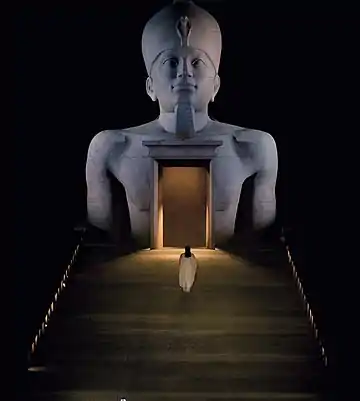 PikiWiki Israel 13773 AIDA AT MASADA 2011
PikiWiki Israel 13773 AIDA AT MASADA 2011%252C_in_the_title_r%C3%B4le_of_Nina_(Scene_V).jpg.webp) Portrait of Madame Dugazon (Louise Rosalie Lefèvre), in the title rôle of Nina (Scene V)
Portrait of Madame Dugazon (Louise Rosalie Lefèvre), in the title rôle of Nina (Scene V)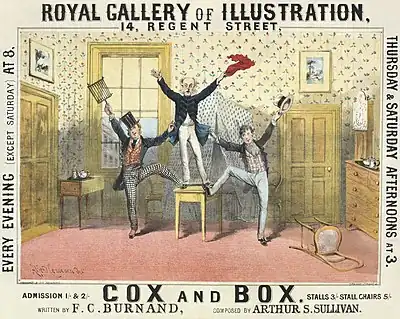 Poster for Burnand and Sullivan's Cox and Box - Royal Gallery of Illustration
Poster for Burnand and Sullivan's Cox and Box - Royal Gallery of Illustration Poster for Gilbert and Clay's Ages Ago at the Royal Gallery of Illustration
Poster for Gilbert and Clay's Ages Ago at the Royal Gallery of Illustration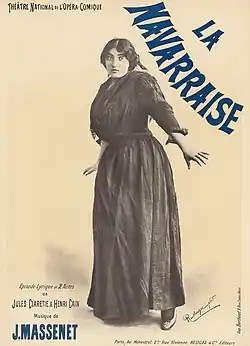 Poster for Jules Massenet's La Navarraise with Emma Calvé in the rôle of Anita
Poster for Jules Massenet's La Navarraise with Emma Calvé in the rôle of Anita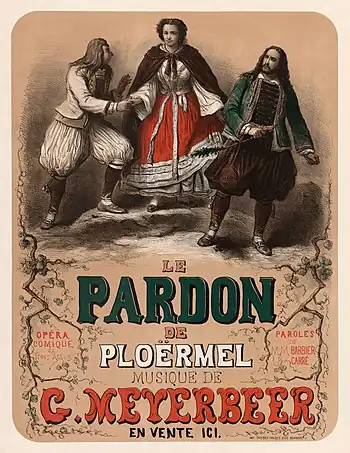 Poster for Le pardon de Ploërmel 1859
Poster for Le pardon de Ploërmel 1859 Prudent-Louis Leray - Poster for the première of Georges Bizet's Carmen
Prudent-Louis Leray - Poster for the première of Georges Bizet's Carmen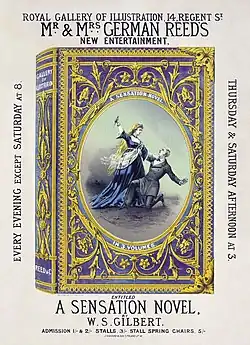 Robert Jacob Hamerton - Poster for A Sensation Novel
Robert Jacob Hamerton - Poster for A Sensation Novel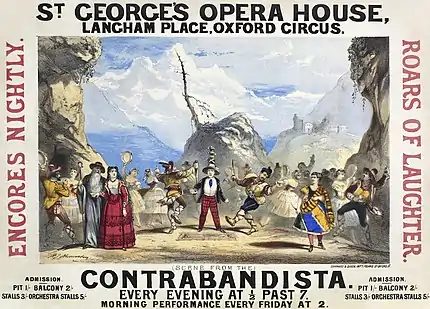 Robert Jacob Hamerton - Poster for F. C. Burnand and Arthur Sullivan's The Contrabandista
Robert Jacob Hamerton - Poster for F. C. Burnand and Arthur Sullivan's The Contrabandista_-_Archivio_Storico_Ricordi_FOTO002701_-_Restoration.jpg.webp) Rosa Raisa (1917) - Archivio Storico Ricordi FOTO002701 - Restoration
Rosa Raisa (1917) - Archivio Storico Ricordi FOTO002701 - Restoration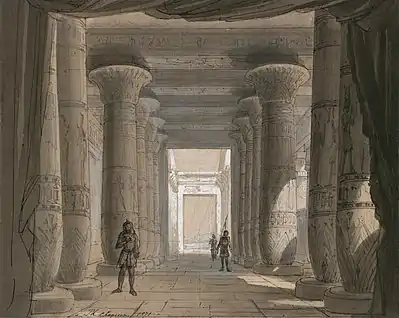 Set design by Philippe Chaperon for Act1 sc2 of Aida by Verdi 1871 Cairo - Gallica - Restored
Set design by Philippe Chaperon for Act1 sc2 of Aida by Verdi 1871 Cairo - Gallica - Restored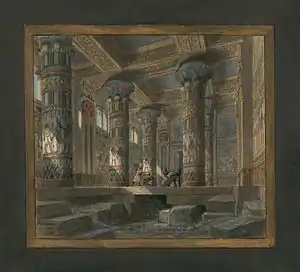 Set design by Philippe Chaperon for Act4 sc2 of Aida by Verdi 1880 Paris
Set design by Philippe Chaperon for Act4 sc2 of Aida by Verdi 1880 Paris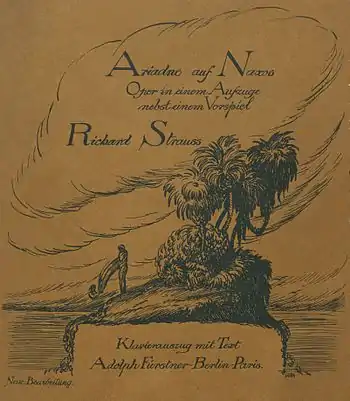 Strauss, Richard - Ariadne auf Naxos - Restoration
Strauss, Richard - Ariadne auf Naxos - Restoration_-_Archivio_Storico_Ricordi_ICON011721_-_Restoration%252C_crop.jpg.webp) Tavola 5, bozzetto di Gebrüder Brückner per Tannhäuser (s.d.) - Archivio Storico Ricordi ICON011721 - Restoration, crop
Tavola 5, bozzetto di Gebrüder Brückner per Tannhäuser (s.d.) - Archivio Storico Ricordi ICON011721 - Restoration, crop Teatro Municipal de São Paulo 8
Teatro Municipal de São Paulo 8.jpg.webp) The Mikado Chappell Vocal Score cover (c.1895)
The Mikado Chappell Vocal Score cover (c.1895) Thespis - Illustrated London News Jan 6 1872
Thespis - Illustrated London News Jan 6 1872 Trial by Jury - Chaos in the Courtroom
Trial by Jury - Chaos in the Courtroom Utopia Limited Poster
Utopia Limited Poster_-_Archivio_Storico_Ricordi_ICON000128_B.jpg.webp) Vasta spianata presso Courtray, bozzetto di Giuseppe Palanti per Edgar (s.d.) - Archivio Storico Ricordi ICON000128 B
Vasta spianata presso Courtray, bozzetto di Giuseppe Palanti per Edgar (s.d.) - Archivio Storico Ricordi ICON000128 B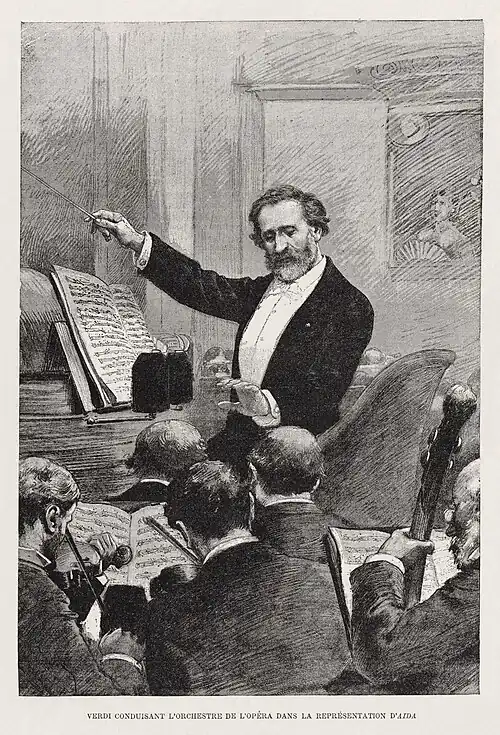 Verdi conducting Aida in Paris 1880 - Gallica - Restoration
Verdi conducting Aida in Paris 1880 - Gallica - Restoration%252C_figurino_di_Adolf_Hohenstein_per_La_Wally_(1892)_-_Archivio_Storico_Ricordi_ICON004639_-_Restoration.jpg.webp) Wally (soprano), figurino di Adolf Hohenstein per La Wally (1892) - Archivio Storico Ricordi ICON004639 - Restoration
Wally (soprano), figurino di Adolf Hohenstein per La Wally (1892) - Archivio Storico Ricordi ICON004639 - Restoration.jpg.webp) Wilhelm - Costume design for Arac, Gunon, and Scynthius (Princess Ida, 1884)
Wilhelm - Costume design for Arac, Gunon, and Scynthius (Princess Ida, 1884).jpg.webp) Édouard de Reszke by Nadar (BPL Hale Coll)
Édouard de Reszke by Nadar (BPL Hale Coll) Émile Bertrand - Jules Massenet - Cendrillon poster
Émile Bertrand - Jules Massenet - Cendrillon poster
Featured portals
Featured topics
 Operas by Claudio Monteverdi
Operas by Claudio Monteverdi
Categories
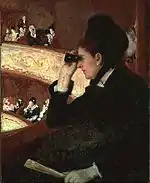
Things you can do
 |
|
Associated Wikimedia
The following Wikimedia Foundation sister projects provide more on this subject:
-
 Commons
Commons
Free media repository -
 Wikibooks
Wikibooks
Free textbooks and manuals -
 Wikidata
Wikidata
Free knowledge base -
 Wikinews
Wikinews
Free-content news -
 Wikiquote
Wikiquote
Collection of quotations -
 Wikisource
Wikisource
Free-content library -
 Wikiversity
Wikiversity
Free learning tools -
 Wiktionary
Wiktionary
Dictionary and thesaurus
-
 List of all portalsList of all portals
List of all portalsList of all portals -
 The arts portal
The arts portal -
 Biography portal
Biography portal -
 Current events portal
Current events portal -
 Geography portal
Geography portal -
 History portal
History portal -
 Mathematics portal
Mathematics portal -
 Science portal
Science portal -
 Society portal
Society portal -
 Technology portal
Technology portal -
 Random portalRandom portal
Random portalRandom portal -
 WikiProject PortalsWikiProject Portals
WikiProject PortalsWikiProject Portals
